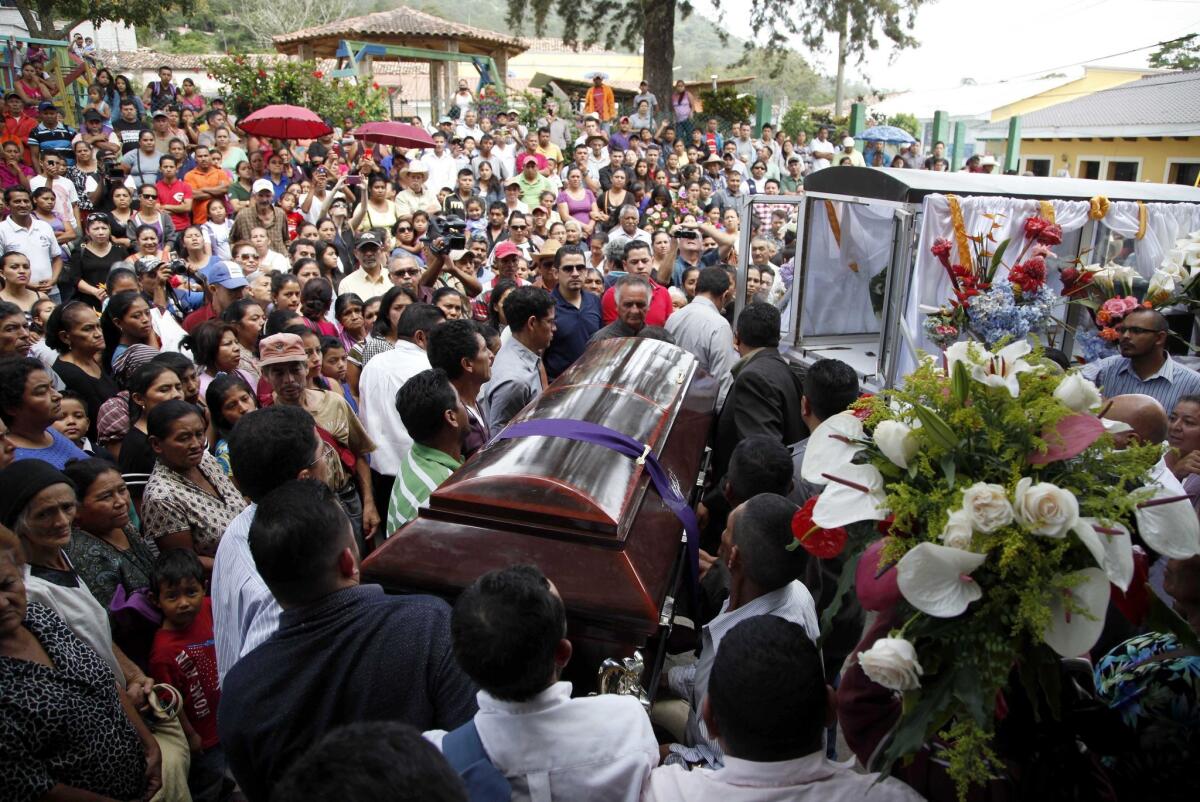Three members of same Honduran environmental group have been murdered over the past 4 months

- Share via
Reporting from Mexico City — The murder of Berta Cáceres, an internationally acclaimed environmental activist in Honduras, briefly focused global attention on embattled grassroots efforts to protect indigenous lands from government-backed hydro-electric projects in the Central American nation.
Cáceres, a recipient of the prestigious Goldman Environmental Prize, was gunned down at her rural home on March 3 in what appeared to be a targeted assassination. The killing sparked worldwide condemnation and allegations of the involvement of government officials and private entrepreneurs.
While initially suggesting that the murder was a crime of passion, Honduran authorities have since arrested five suspects, including an Army officer and at least one employee of a company running a dam project that she opposed.
In the meantime, two other activists affiliated with the same group as Cáceres — the Civic Council of Popular and Indigenous Organizations of Honduras — have also been murdered.
The string of slayings has raised alarms about a possible systemic effort to target the group, which has been at the forefront of regional opposition to the government-backed privatization and exploitation of natural resources.
Government officials have denied any involvement in the slayings and defended hydro-electric projects as necessary for generating electricity across the country.
The latest victim was Lesbia Janeth Urquia, a 49-year old mother of three who was apparently hacked to death with a machete last week.
Denying a political motive, prosecutors said this week that she was killed in a family dispute over an inheritance and announced the arrest of Urquia’s brother-in-law, the alleged plotter, and two men he allegedly hired to carry out the murder.
But Honduran activists immediately rejected that account as a cover-up and suggested that Urquia was killed for publicly opposing a controversial hydro-electric project on the Chinacla River.
“We don’t believe in this [official] version,” Tomas Gomez, head of the indigenous environmental group, said Thursday in a telephone interview. “In this country they invent cases and say that the murders have nothing to do with political issues. The government always tries to dis-connect so as to not admit that these amount to political killings.”
He said the group would continue to push for thorough investigations of all three murders of its members and called for support from international organizations.
Critics of various hydro-electric projects said they would cut off water and otherwise damage the lands of the Lenca people, Mayan descendants who constitute Honduras’ largest indigenous group.
The activists allege widespread collusion in Honduras between government officials and large companies seeking to profit from hydro-electric and other projects affecting native lands.
Olivia Marcela Zuniga, the daughter of Cáceres and an environmental activist herself, called for an international investigation into the three killings.
“We don’t believe the government,” Zuniga said Thursday in a telephone interview from Honduras. “Here they murder social activists, peasants, indigenous people, women. Members of the government are involved. That’s why we call them political assassinations that almost always remain unresolved, with impunity.”
In the case of her mother’s homicide, Zuniga noted, authorities initially suggested that her killing was the result of a “crime of passion.”
The suspects arrested in that case “were poor people” and not the masterminds who planned and financed the killing, she said. Before her slaying, Cáceres had received dozens of death threats because of her high-profile opposition to the Agua Zarca dam project on the Gualcarque River.
Weeks after that murder, Nelson Garcia, another Honduran activist affiliated with the indigenous environmental council, was killed in what police have said was an apparent robbery attempt. Activists have rejected the official version and called for more investigation.
Urquia’s body was found last week near a garbage dump in the highland town of Marcala, west of Tegucigalpa, the capital. She had last been seen going out on her bicycle, her family said. Her head showed signs of trauma from machete blows, according to accounts in the Honduran media.
Honduras has one of the world’s highest rates of murder. Many killings remain unresolved amid widespread gang violence, a proliferation of arms and allegations of official links to criminal bands.
Global Witness, the London-based environmental advocacy group, labels Honduras the most dangerous nation for environmental activists. More than 100 activists have been killed in Honduras since 2010, according to the group.
Sanchez is a special correspondent.
Twitter: @mcdneville
More to Read
Sign up for Essential California
The most important California stories and recommendations in your inbox every morning.
You may occasionally receive promotional content from the Los Angeles Times.












